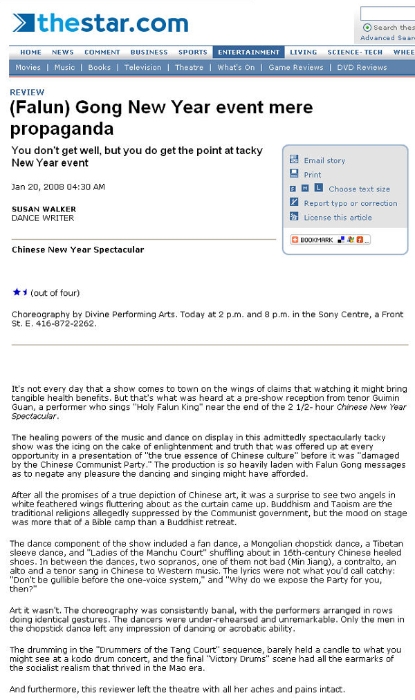It's not every day that a show comes to town on the wings of claims that watching it might bring tangible health benefits. But that's what was heard at a pre-show reception from tenor Guimin Guan, a performer who sings "Holy Falun King" near the end of the 2 1/2- hour Chinese New Year Spectacular.
The healing powers of the music and dance on display in this admittedly spectacularly tacky show was the icing on the cake of enlightenment and truth that was offered up at every opportunity in a presentation of "the true essence of Chinese culture" before it was "damaged by the Chinese Communist Party." The production is so heavily laden with Falun Gong messages as to negate any pleasure the dancing and singing might have afforded.
After all the promises of a true depiction of Chinese art, it was a surprise to see two angels in white feathered wings fluttering about as the curtain came up. Buddhism and Taoism are the traditional religions allegedly suppressed by the Communist government, but the mood on stage was more that of a Bible camp than a Buddhist retreat.
The dance component of the show included a fan dance, a Mongolian chopstick dance, a Tibetan sleeve dance, and "Ladies of the Manchu Court" shuffling about in 16th-century Chinese heeled shoes. In between the dances, two sopranos, one of them not bad (Min Jiang), a contralto, an alto and a tenor sang in Chinese to Western music. The lyrics were not what you'd call catchy: "Don't be gullible before the one-voice system," and "Why do we expose the Party for you, then?"
Art it wasn't. The choreography was consistently banal, with the performers arranged in rows doing identical gestures. The dancers were under-rehearsed and unremarkable. Only the men in the chopstick dance left any impression of dancing or acrobatic ability.
The drumming in the "Drummers of the Tang Court" sequence, barely held a candle to what you might see at a kodo drum concert, and the final "Victory Drums" scene had all the earmarks of the socialist realism that thrived in the Mao era.
And furthermore, this reviewer left the theatre with all her aches and pains intact.
(The Star, January 20, 2008)

Original text from: http://www.thestar.com/entertainment/article/295651